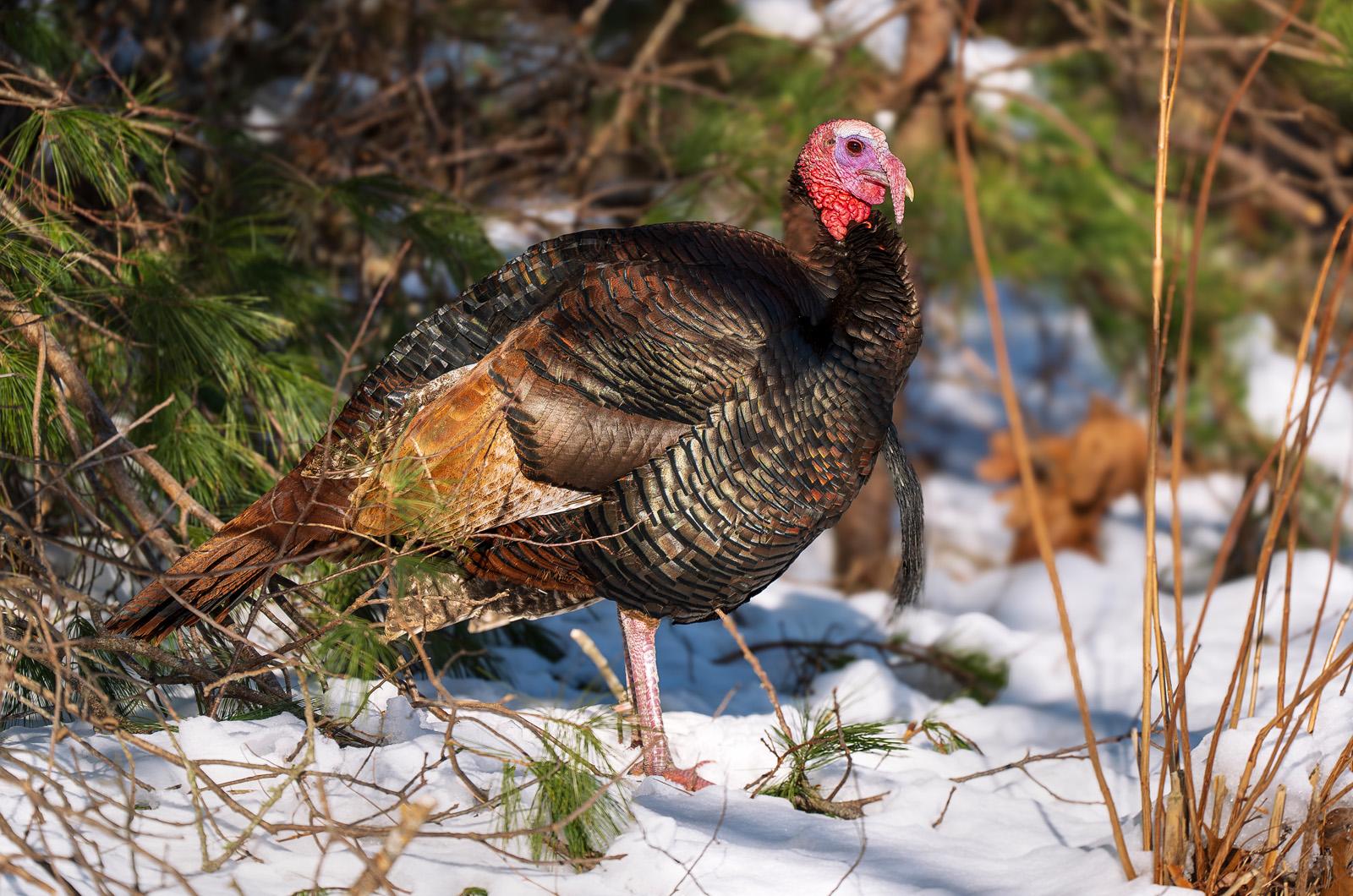In the evening the turkeys put themselves to bed. I take in the sight at the West Tisbury graveyard, my car parked at the side of the sharp curve in the road, the dog Artichoke by my side.
The turkeys arrive from all over, back from a day of wandering. Some come from yards nearby, others cross the road from farther away at the Agricultural Hall. Each flock is 10 or 20 turkeys strong and all converge at the graveyard near a stand of tall pine trees.
They walk and then they wait, stretching out in single lines all over the field, or in less orderly bunches among the gravestones. Artichoke and I stand motionless in the fading light, silent witnesses to nature’s choreography.
Suddenly a turkey will let out a squawk and move from stationary to full sprint, its wings working overtime. It is not a pretty sight, no effortless liftoff or glide. It is slow and noisy, more like someone threw something heavy into the air that will soon fall to the ground.
Landings are not much better.
A turkey aims for the high branches. It arrives with a thud, branches swaying on impact, and then adjusts, steadying itself or hopping to a more preferable perch. Then the other turkeys take their turns, one by one, as if tuned into some air traffic controller calling out to them: “Turkey number 24, you are cleared for takeoff.”
Gradually, they all move from ground to tree, disappearing among the pines and settling in for the night.
I am not sure when I became a man drawn to graveyards at dusk and the sight of turkeys putting themselves to bed. Or maybe I have always been this way. In any case, Artichoke and I come here often, mostly in winter when the light fades long before dinner. What it does for the dog I am not sure, but for me it is a tonic. I feel rooted and grateful, able to look back on my day anew.
On Saturday, I brought my daughter Pickle with me — not her physical self, she was headed to a sleepover and had no desire for dog walks in a graveyard — but her presence was beside me just the same. That afternoon we had looked at a used car, not just any car but one for her to drive. In a month she will turn 16.
When Pickle was about eight years old I said in what I thought was an offhanded way, that I never wanted her to grow up — that she was perfect at that age. I thought I was praising who she was at the time and letting her know how much I loved her. But later that night I found her with Cathlin, weeping uncontrollably in her mother’s arms, worried she would always be a disappointment to me because she could not help growing older.
I never said those words again, although I feel them often.
When our son Hardy left for college a year and a half ago, there were many feelings — excitement for him and sadness for us, this shift in the family unit from four to three. But mostly it was confusion that followed me around, as if I had misplaced something important but couldn’t remember where I put it.
When I think ahead to Pickle leaving home, which now with a car in the picture feels more real, I suspect I will confront a new depth of feeling, one I have yet to encounter. Already it is a dull ache, throbbing deep in my gut.
One of the joys of parenting for me has been traveling a two-way street of sorts, moving forward in time as I watched my children grow up, and moving backwards, getting to know once again the boy I once was. Playing sports, learning to read, body surfing Vineyard waves, crying at night worried about the monsters hiding in the closet or under the bed — it all came back to me as I helped my children navigate their own paths, only now filtered through the longing of a father’s eyes.
Now that the kids are older, one already out of the house the other preparing to drive away, I am visited often by my teenage self, a much more complicated creature. That period of life felt like so many questions as I ran around at top speed with my arms and mouth open wide trying desperately to take it all in. In the end, it added up to one question on repeat: What next? What next? What next?
The question returns: What do parents become after all the children have left home? I know, of course, that parenting is for life, but there is no getting around the seismic shift of this next stage. When the subject comes up with other parents who have already experienced this, the answers are varied and complex, but also anchored in that same one question on repeat: What next? What next? What next?
Perhaps the turkeys have something to say about this, along with my much younger self, who I recall was more inclined to encounter the world with awe at any moment. Watching the turkeys at night, I feel close to that little boy again, as if he is tapping me on the shoulder and welcoming me home. For a moment, the questions fall away and the answers no longer feel so important.
My thoughts turn to Pickle, crying in her mother’s arms, and I want to tell that little girl about my new discovery, that maybe it is possible to not grow older, it just takes a very long time.
Artichoke and I have yet to come back to the graveyard at dawn to watch the turkeys return to the ground. Perhaps it is an easier task, a simple glide to the grass. But I doubt it. Leaving the nest never is.




Comments (10)
Comments
Comment policy »